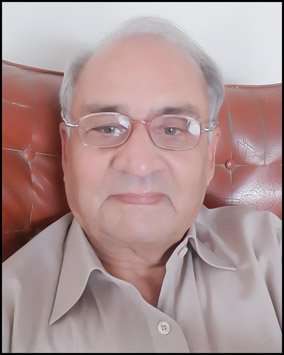A senior citizen accompanying a patient of mine was very distrustful of our doctors. Noticing his body language, I asked whether he had experienced a bitter encounter in the past. In response to my query, he narrated this story.

Dr. Munawar Aziz
He said his 28-year-old son, who divides his time between Pakistan and Hong Kong, was diagnosed with hypertension in Pakistan during a vacation. His son had been experiencing headaches and often turned pale after these episodes, which occurred intermittently. Various lab tests were conducted to determine the cause of his high blood pressure at such a young age, but all tests—including an abdominal ultrasound, MRI, and adrenaline studies—revealed nothing.
Before traveling back to Hong Kong to resume his duties, his son was prescribed an antihypertensive. In Hong Kong, his doctor advised repeating the tests. A repeat MRI revealed a tumor in the right suprarenal gland, and he was diagnosed with pheochromocytoma. He underwent surgery to remove the tumor, and his blood pressure returned to normal.
He shared that this ordeal—his son being undiagnosed in Pakistan despite undergoing the most expensive tests—left him distrustful of doctors in his own country. I had no choice but to listen to his story and reflect on where and what went wrong in diagnosing this case.
We have very competent doctors, and our lab services and radiologists are at par, if not better, than the rest of the world. Pheochromocytoma is a rare, usually benign tumor that develops in the adrenal glands, which are small, triangular-shaped organs located above the kidneys. These tumors arise from chromaffin cells responsible for producing catecholamines such as adrenaline and noradrenaline.
While pheochromocytomas are uncommon, they can cause significant health issues if left untreated. The hallmark of pheochromocytoma is the excessive release of adrenaline-like hormones, leading to episodic symptoms such as high blood pressure, rapid heart rate, sweating, headaches, and anxiety. These episodes can vary in intensity and frequency and are often triggered by stress, physical exertion, or certain medications.
Diagnosis typically involves a combination of biochemical tests, such as measuring catecholamine levels in the blood or urine, and imaging studies like CT or MRI scans to locate the tumor. Once diagnosed, surgical removal of the tumor is the primary treatment. In cases where surgery is not possible, medications may be used to control symptoms. Although most pheochromocytomas are benign, about 10% can become malignant and spread to other parts of the body. Early detection and appropriate management are crucial to prevent complications. Regular follow-ups are essential to monitor for recurrence, ensuring long-term health and well-being.
Though I have reservations about his story, every story has a lesson to learn. It should make us more vigilant in diagnosing rare illnesses, and if in doubt, one should not hesitate to seek a second opinion from a senior and more experienced colleague.
Moral of the story: Always investigate all high blood pressure patients, especially those who develop it at a younger age. If in doubt, repeat investigations at a different facility.
- Dr. Munawar Aziz
Abbottabad, Pakistan.
aziz.munawar@gmail.com




Very right. Health of a person is more important than sticking to the opinion of one doctor. Always go for a second and even third opinion if the problem is not responding to treatment suggested.
Looking for secondary causes of hypertension in individuals less than 50 years of age is valid, but a good history including lifestyle assessment including work, family circumstances and psycho-social assessment is key to good management. I personallly do not advise medication early in this age group and like to understand the importance my patient gives to exercise and weight reduction. For those who are willing ( and most are), I encourage them to buy a blood pressure machine as an investment into managing their medical condition. Assessment of a patient recorded chart of blood pressure plus level of exercise undertaken gives valuable insight into assessing the need for further investigation and drug therapy. As I do not own a pharmacy or clinical laboratory, I am under no pressure to advise un-necessary drugs or tests.
Ture Sir. Need much more efforts and serious attitudes must in our country health care.
Yes. All hypertension patients to be diagnosed properly after more than three readings under unbiased circumstances and with a good and calibrated BP apparatus.
The younger patient hypertension is of special importance and causes of secondary hypertension has to be excluded. Convincing a patient for lab tests at imaging is not always possible but doctors casual attitude is also noteworthy.